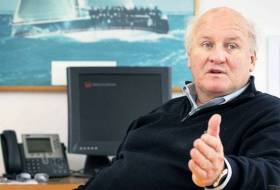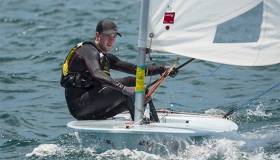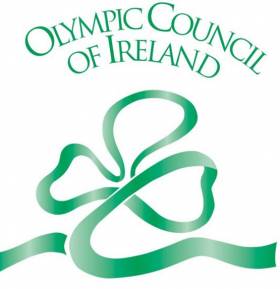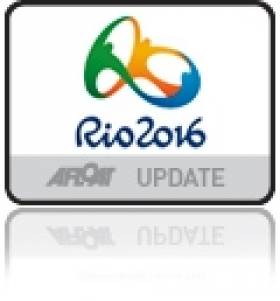Displaying items by tag: OCI
OCI Election: Irish Sailing's Colm Barrington Seeks 'Athlete Rather than Official Centred Organisation'
The Irish Sailing Association (ISA) has nominated Colm Barrington (70) as a candidate for 'First Vice President' in February's election of the Olympic Council of Ireland (OCI) Executive Committee. The Irish sailing champion and former Aer Lingus Chairman says he is running 'in support of Sarah Keane's bid to be OCI President and her reform programme'.
The OCI election is shaping up to be a battle between the old guard and those seeking change for an organisation in crisis. For the first time since 1989, long-standing president Pat Hickey will not be running in the election.
Sarah Keane, William O’Brien and Bernard O’Byrne are the candidates who will fight it out for the OCI's top position at next month's meeting.
Barrington, a global aircraft leasing chief, is in no doubt about the work ahead if elected and pulls no punches about the current state of the OCI in the Afloat.ie interview below. His experience is that 'the OCI has done nothing to support the efforts of our high performance sailors'. He also says 'the successes of Annalise and the rest of the team in Rio, and at previous Olympic Games, were despite the OCI and not because of anything they did for us'.
Sailing's sole nomination for the XXXII Olympiad – Tokyo, Japan 2020 executive is running against Irish Taekwondo's Martin Fleming for the First Vice President role.
Barrington, a passionate Irish sports fan, served for 12 years as Chairman of the ISA's Olympic Group stepping down after Rio. He continues to Chair the Irish Sailing Foundation, the Olympic fundraising body for sailing, established by him in 2015.
He maintains Ireland’s success rate at the Olympic Games is not good enough, particularly for a 'sports–mad and relatively well–off nation'.
Irish Sailing's candidate also says he hopes the terms of office of future OCI officials and Executive Committee members will not exceed eight years.
The election will take place on Thursday, 9th February 2017 at the Conrad Hotel, Dublin.
Read the interview below
Afloat.ie: What future direction do you think the OCI should go in?
Colm Barrington (CB): I am passionate about sport and, particularly, about achieving international success. Ireland’s success rate at Olympic Games is not good enough, particularly for a sports-mad and relatively well-off nation. In Rio, Ireland’s two medals put us 62nd in the medals table out of the 87 countries that won any medals. The OCI needs to respond to that situation and assist our athletes, their coaches, their families and their federations to be more successful. Olympic success is the best way to promote the Olympic movement in Ireland. The OCI needs to up its game in this regard.
Assistance needs to include helping federations to bring in the right people for both governance and management and to develop high performance programmes with them. It also needs to include providing appropriate logistical and management support at Olympic Games and focusing on maximising financial support that can be passed on to the athletes and their programmes. The OCI must focus on athletes rather than on itself and its officials. Simple changes, such as making Olympic tickets available to athletes and their families, can help the Olympic movement greatly.
While my main objective would be to help make the OCI a truly athlete centred organisation, I would also aim to bring my corporate experience to help institute appropriate governance in line with best international practise. Specifically, I would plan to oversee implementation of the recommendations of the Deloitte Report.
It is also important that the OCI becomes an important part of Irish social life and an influential supporter of the many benefits of Olympic sport in this country. In this regard the performance and results of the OCI and the GAA are poles apart. I would hope to use my relationships at all levels of Irish and international society to help restore the OCI’s reputation and to enhance its profile with commercial sponsors.
What lessons from your successful work as Chair of the ISA's Olympic Group do you think could be useful for the OCI and other Irish Olympic sports?
CB: I am proud to have witnessed Ireland's high performance sailing programme develop from ad hoc talent management into a high performance system which has produced numerous international successes at junior, intermediate and senior levels and, finally, Annalise’s Olympic medal in Rio after her near-miss in London.
In my experience the Olympic Council of Ireland has done nothing to support the efforts of our high performance sailors. The successes of Annalise and the rest of our team in Rio, and at previous Olympic Games, were despite the OCI and not because of anything they did for us. Indeed, at Rio their arrangements for accommodation, transport and accreditations were useless and we had to make our own parallel accommodation and transport arrangements at an additional cost of €70,000. This was a big part of our 2016 budget and has resulted in corresponding cutbacks in other parts of our HP programme. And it was all as a result of the OCI’s unwillingness to respond to our reasonable requests and to focus on what was needed to support our athletes as they tried to achieve success. I assume that they treated other athlete groups in a similar manner.
The OCI needs to help our sporting federations to institute appropriate programmes to support athletes’ ambitions, to help get the right people to run the programmes and to maximize the funding support that is available for our athletes.
Given the recent changes recommended in the Deloitte report do you consider your nomination to be an engine for change?
CB: There are significant changes required in its governance in order to restore the reputation of the OCI and to ensure that it is regarded among the most respected sports organisations in the country. A strong and respected OCI will be of huge benefit to its member federations and is also vital in maximising the potential of Irish high performance athletes on the world stage. I hope that I can help make this happen. There are many recommendations in the Deloitte report, but I hope that one of their main recommendations - that terms of office of OCI officials and Executive Committee members should not exceed eight years - will be taken seriously by the federations and will apply to the upcoming election.
OCI vice-presidents can go forward for nomination to the Presidency every four years. Is this a role you would consider?
CB: I am running for the position of First Vice President in support of Sarah Keane bid to be President and in support of her reform programme. I believe that I can make my best contribution to the OCI and its member federations by helping change the OCI’s focus to an athlete rather than official centred organisation, by improving governance and by creating openness and fairness. I have no aspirations to be President.
Download the OCI's List of Nominations for Election of Officers and Executive below.
Read more about Colm Barrington's role in Irish Olympic sailing in Afloat's pre–Rio interview here.
#Rio2016 - The mother of Irish Laser Olympian Finn Lynch nearly missed seeing him in Rio after failing to secure tickets through the official Irish supplier that's become embroiled in controversy in recent days.
The Irish Times reports on Grainne Adams' interview with Newstalk Breakfast, in which she explained how after great difficulty in contacting Pro10 Sports Management in the run-up to the event, she resorted to a Norwegian ticket resale website in order to attend the opening ceremony earlier this month.
Adams also said that despite the special ticket scheme for friends and family of Olympic athletes, Pro10 told her they did not have tickets for any events in the Olympic sailing regatta, in which Lynch finished a respectable 32nd as he preps for a stronger challenge in Tokyo in four years' time.
As previously reported on Afloat.ie, an allocation of unused official tickets for athletes' families and friends was seized from the Olympic Council of Ireland's (OCI) offices at the Olympic Village in the ongoing Brazilian police investigation into alleged ticket touting.
OCI president Pat Hickey was arrested in his hotel last week on a number of charges related to the illicit resale of Olympic tickets, while other OCI members have have their passports, phones and computers seized pending questioning.
Hickey is reportedly sharing a cell in Rio's Bangu Prison with THG Sports director Kevin Mallon, who was arrested on Friday 5 August in possession of hundreds of tickets for high-profile Olympic events.
Brazilian Police Raid OCI Office at Olympic Village
Early this morning in Rio, Brazilian police arrived at the Olympic Council of Ireland (OCI) offices in the Olympic village and at OCI accommodation outside of the village. They were met by OCI personnel. No arrests were made. The police took possession of their passports along with their phones and laptops. The OCI personnel were asked to present for questioning at a local police station on Tuesday (23rd August) next. They agreed to do so.
The OCI had an allocation of unused official tickets in their offices which had been made available for athletes’ families and friends. The police also took possession of these tickets, according to an OCI press statement.
Pat Hickey, who has temporarily stood down as president of the Olympic Council of Ireland, was arrested at his hotel early on Wednesday morning, by police from the Rio Police fraud unit.
He is facing three charges of facilitating ticket touting, formation of a cartel and ambush or illicit marketing.
This evening the Executive Committee of the Olympic Council of Ireland met for the first time in person since the Games began in Rio. The Committee discussed recent events in Rio regarding ticketing arrangements at the Games which it takes very seriously.
The Executive Committee made the following decisions:
· They appointed a three person crisis management subcommittee to lead the Council’s response to the recent events in Rio. This group comprises Sarah Keane (Swim Ireland), Prof Ciaran O’Cathain (Athletics Ireland) and Robert Norwood (Snowsports Association of Ireland).
· The subcommittee will appoint an international accountancy firm to conduct an independent review of ticketing arrangements in Rio. The firm will be selected this week and its work will begin immediately and its terms of reference will be published.
· The report prepared by the firm will be presented to the judge who will chair the State inquiry into the OCI’s handling of ticketing at the Rio Olympics.
OCI Seek Supporting Evidence from ISA on Olympic Sailing Waters Pollution
#oci – The Olympic Council of Ireland (OCI) has responded to claims by the Irish Sailing Association that the 2016 Olympic waters are a 'health hazard'. OCI president Pat Hickey, who is a member of the International Olympic Committee's, Rio 2016 Coordination Commission told the Irish Times he has not heard of this level of pollution. The OCI is to seek supporting evidence from the ISA about the problem.
Sailors, who have been to training camps in and around the Olympic course, have described water that was heavily contaminated with sewage and believe it is a health risk.
In a statement released yesterday, the OCI said they will address the Irish sailors' concerns. "The Irish Sailing High Performance Team did not consult with the Olympic Council of Ireland on this matter so the OCI would need to ascertain the full extent of their concerns.
The Irish Times has much more on the story here.

































































